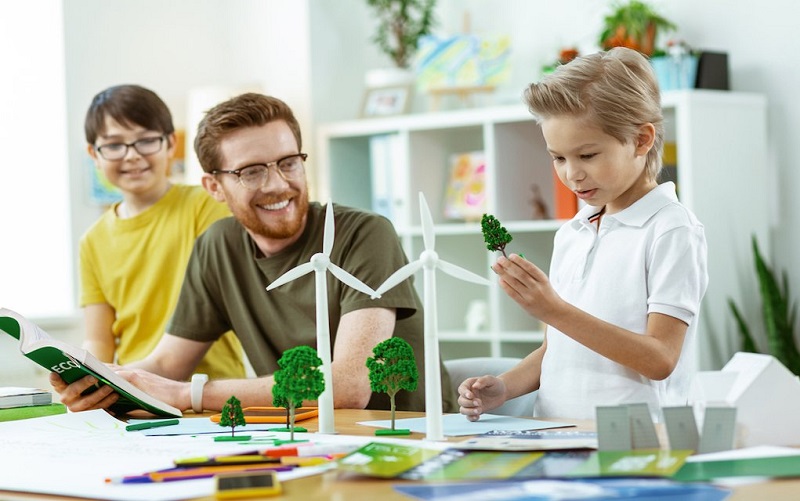Teaching Kids Sustainability with These 6 Eco-Friendly Activities

Living in a time when the icecaps are close to melting calls for urgent actions – teaching the youngest about sustainability as soon as possible. Children best learn through play, so why not consider educational activities you can use to implement the ever-needed knowledge into your kids? Instead of going to a baseball game this weekend, consider spending time talking about eco-friendliness as you build a birdhouse, grow a garden or make cloth napkins together. Keep reading to get ideas for more activities through which you’ll teach kids sustainability.
Reuse items to craft new ones
Reusing is one of the best ways to cut down on waste. Instead of throwing glass jars away, reuse them in one of the arts and crafts projects with kids. Turning mason jars into pencil holders is one way to upcycle the items. Do you need a new whimsical flower vase? Grab one of the large jars, and start repainting them together. Don’t spend money on a new jar to put your pasta in. Save the old jars, write the type of pasta on them, and store your favourite fusilli or penne in them.
Separate recycling from general rubbish together
Who is in charge of taking out the rubbish? Is it you or your partner? Once kids are old enough to understand the concept of rubbish, start teaching them about separating recycling from general rubbish. Have them around when you do it, place separate bins for every type of rubbish and start a game. Award points for every item that they separate successfully in a specific bin. Treat them with a toy or other type of favourite award to keep them motivated to separate the rubbish in the future and learn to love sustainability.
Make your cloth napkins
Bonding through educational activities is always a clever way to spend pastime with kids. Do you have old t-shirts or bedding that are still in good condition but the colour faded slightly? Don’t throw it away but use it to make DIY cloth napkins. Not only will you preserve the fabric, but you’ll also teach kids about upcycling and reusing old items. You’ll need a pair of scissors for yourself, and you can dig into the special needs educational toys you’ve bought for your kids earlier and pick up scissors for kids so they can participate in the project. Instead of leaving them to observe, include the kids in the project so they will feel valued and learn through play. Get the whole family together so each member will do a specific task. One of you can pick the material, the other will draw templates, and another one can cut out napkins. For older kids, this can be a fun way to teach them how to sew the edges.
Plant a garden
Are you looking for more eco-friendly activities to do outdoors? Have you considered planting a garden? Vegetables and fruits are ideally planted in the summer, especially in sunny areas that don’t get too much rain. If you need a winter project, planting a herb garden is equally educational and eco-friendly. Considering kids will be very anxious to see the results and impatient to see the herbs grow fully, this is an excellent project that offers quick results. Start with small pots that you can easily fit on the windowsill. Plant seeds inside and expect outcomes to dazzle the kids.
Work on a bird feeder together
Educate kids on the ecological matter by making a bird feeder together. On top of that, they’ll also learn how to care for wild creatures. An additional benefit, the birds that come by to feed on the bird feeder you make will, in return, eat insects from your garden. There’s no pest control more organic than that, so you’re welcome. Forget about all those damaging pesticides and various chemicals. Build a bird feeder from pine cones, paper rolls or plastic bottles to teach kids about sustainability. Try using as many items already in your home instead of shopping for ingredients.
Build a water collection point
If you’re living in a rainy area, you might want to consider setting up a water collection point. The water you collect can later be used for watering plants, in case you face a drought. Even if you don’t, it will help you conserve water because you would have picked up rain earlier during the rainy season. Get the kids to help set up a water collection point and teach them about water conservation. Furthermore, you won’t have to fear flooding in the garden during heavy downpours because the collection point will safely collect all the rain and steer the water away from flood-prone areas.
Final thoughts
Do your best to teach kids about sustainability because our planet depends on it. Make it fun for them and teach through games and fun activities that you will enjoy together, so that sustainability can become fun for them from day one.